Financial Reporting, Social Contract, Stakeholders and Legitimacy
VerifiedAdded on 2021/06/17
|10
|3194
|31
Report
AI Summary
This report provides a comprehensive analysis of financial reporting, social contracts, and organizational legitimacy, drawing on case studies and academic research. Section A examines suggestions for improving financial reporting systems, comparing the usefulness of financial statements in Australia and the United States, and addressing current communication problems within the financial reporting process. Section B delves into the concept of a social contract between banks and the community, exploring its explicit and implicit terms, identifying stakeholder groups, and evaluating their roles, motivations, and strategies in the context of ATM withdrawal fees. The report also investigates organizational legitimacy, its impact in the case study, and the strategies used to regain it, supported by relevant theories and examples. The analysis covers IFRS standards, the impact of intangible assets on financial statements, and the challenges of implementing financial reporting standards uniformly across different countries. The report uses the context of the Australian banking sector to illustrate the practical implications of these concepts.
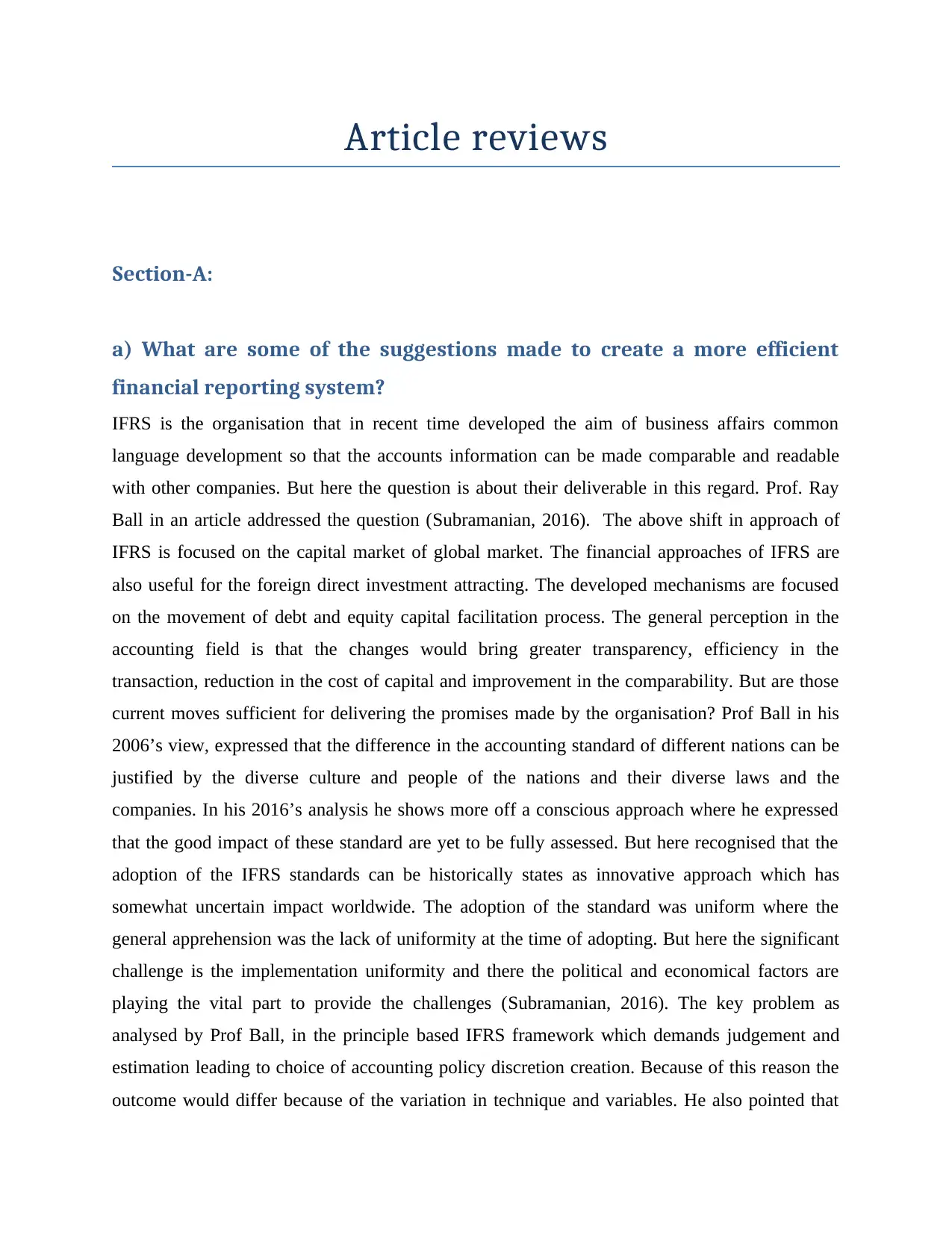
Article reviews
Section-A:
a) What are some of the suggestions made to create a more efficient
financial reporting system?
IFRS is the organisation that in recent time developed the aim of business affairs common
language development so that the accounts information can be made comparable and readable
with other companies. But here the question is about their deliverable in this regard. Prof. Ray
Ball in an article addressed the question (Subramanian, 2016). The above shift in approach of
IFRS is focused on the capital market of global market. The financial approaches of IFRS are
also useful for the foreign direct investment attracting. The developed mechanisms are focused
on the movement of debt and equity capital facilitation process. The general perception in the
accounting field is that the changes would bring greater transparency, efficiency in the
transaction, reduction in the cost of capital and improvement in the comparability. But are those
current moves sufficient for delivering the promises made by the organisation? Prof Ball in his
2006’s view, expressed that the difference in the accounting standard of different nations can be
justified by the diverse culture and people of the nations and their diverse laws and the
companies. In his 2016’s analysis he shows more off a conscious approach where he expressed
that the good impact of these standard are yet to be fully assessed. But here recognised that the
adoption of the IFRS standards can be historically states as innovative approach which has
somewhat uncertain impact worldwide. The adoption of the standard was uniform where the
general apprehension was the lack of uniformity at the time of adopting. But here the significant
challenge is the implementation uniformity and there the political and economical factors are
playing the vital part to provide the challenges (Subramanian, 2016). The key problem as
analysed by Prof Ball, in the principle based IFRS framework which demands judgement and
estimation leading to choice of accounting policy discretion creation. Because of this reason the
outcome would differ because of the variation in technique and variables. He also pointed that
Section-A:
a) What are some of the suggestions made to create a more efficient
financial reporting system?
IFRS is the organisation that in recent time developed the aim of business affairs common
language development so that the accounts information can be made comparable and readable
with other companies. But here the question is about their deliverable in this regard. Prof. Ray
Ball in an article addressed the question (Subramanian, 2016). The above shift in approach of
IFRS is focused on the capital market of global market. The financial approaches of IFRS are
also useful for the foreign direct investment attracting. The developed mechanisms are focused
on the movement of debt and equity capital facilitation process. The general perception in the
accounting field is that the changes would bring greater transparency, efficiency in the
transaction, reduction in the cost of capital and improvement in the comparability. But are those
current moves sufficient for delivering the promises made by the organisation? Prof Ball in his
2006’s view, expressed that the difference in the accounting standard of different nations can be
justified by the diverse culture and people of the nations and their diverse laws and the
companies. In his 2016’s analysis he shows more off a conscious approach where he expressed
that the good impact of these standard are yet to be fully assessed. But here recognised that the
adoption of the IFRS standards can be historically states as innovative approach which has
somewhat uncertain impact worldwide. The adoption of the standard was uniform where the
general apprehension was the lack of uniformity at the time of adopting. But here the significant
challenge is the implementation uniformity and there the political and economical factors are
playing the vital part to provide the challenges (Subramanian, 2016). The key problem as
analysed by Prof Ball, in the principle based IFRS framework which demands judgement and
estimation leading to choice of accounting policy discretion creation. Because of this reason the
outcome would differ because of the variation in technique and variables. He also pointed that
Paraphrase This Document
Need a fresh take? Get an instant paraphrase of this document with our AI Paraphraser
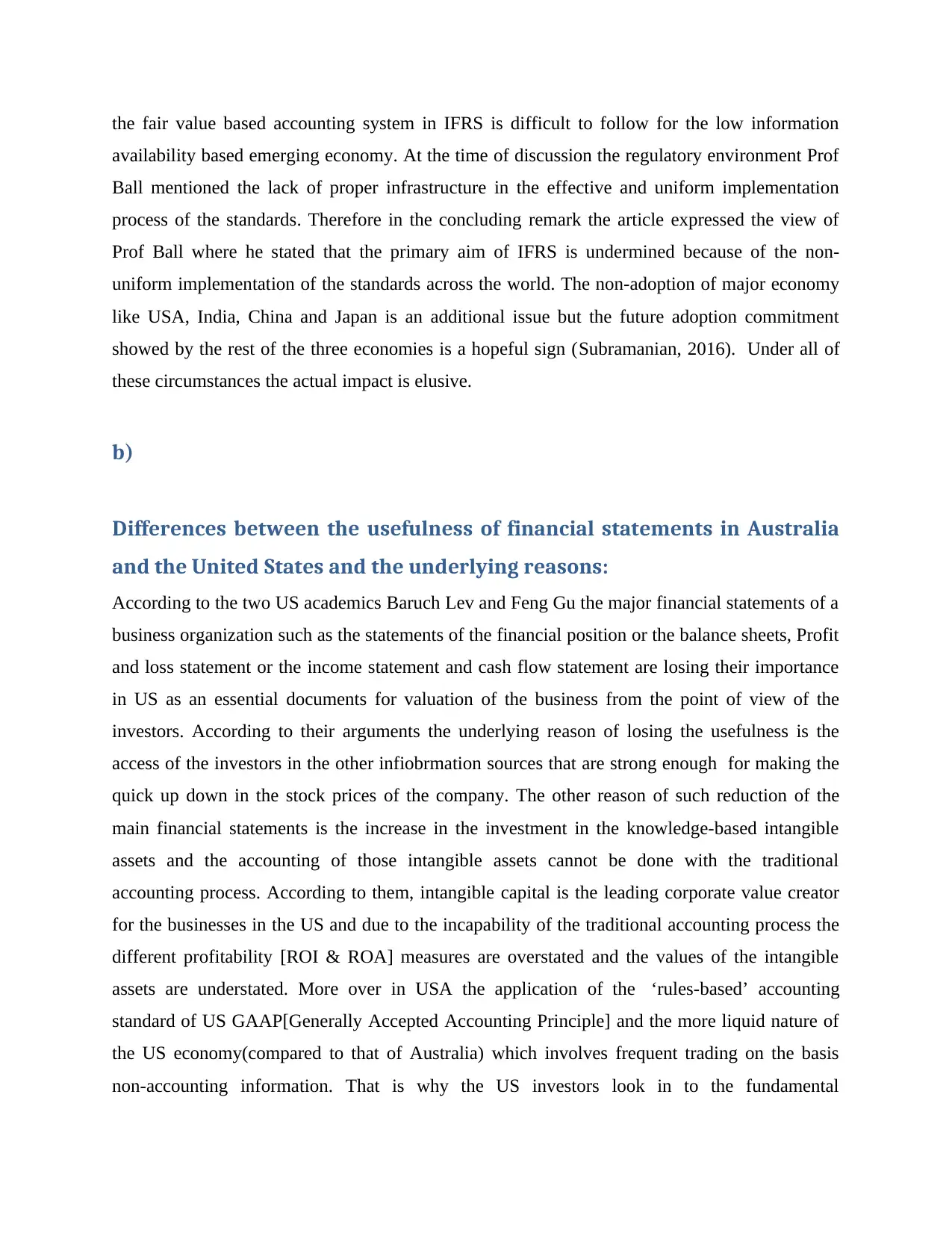
the fair value based accounting system in IFRS is difficult to follow for the low information
availability based emerging economy. At the time of discussion the regulatory environment Prof
Ball mentioned the lack of proper infrastructure in the effective and uniform implementation
process of the standards. Therefore in the concluding remark the article expressed the view of
Prof Ball where he stated that the primary aim of IFRS is undermined because of the non-
uniform implementation of the standards across the world. The non-adoption of major economy
like USA, India, China and Japan is an additional issue but the future adoption commitment
showed by the rest of the three economies is a hopeful sign (Subramanian, 2016). Under all of
these circumstances the actual impact is elusive.
b)
Differences between the usefulness of financial statements in Australia
and the United States and the underlying reasons:
According to the two US academics Baruch Lev and Feng Gu the major financial statements of a
business organization such as the statements of the financial position or the balance sheets, Profit
and loss statement or the income statement and cash flow statement are losing their importance
in US as an essential documents for valuation of the business from the point of view of the
investors. According to their arguments the underlying reason of losing the usefulness is the
access of the investors in the other infiobrmation sources that are strong enough for making the
quick up down in the stock prices of the company. The other reason of such reduction of the
main financial statements is the increase in the investment in the knowledge-based intangible
assets and the accounting of those intangible assets cannot be done with the traditional
accounting process. According to them, intangible capital is the leading corporate value creator
for the businesses in the US and due to the incapability of the traditional accounting process the
different profitability [ROI & ROA] measures are overstated and the values of the intangible
assets are understated. More over in USA the application of the ‘rules-based’ accounting
standard of US GAAP[Generally Accepted Accounting Principle] and the more liquid nature of
the US economy(compared to that of Australia) which involves frequent trading on the basis
non-accounting information. That is why the US investors look in to the fundamental
availability based emerging economy. At the time of discussion the regulatory environment Prof
Ball mentioned the lack of proper infrastructure in the effective and uniform implementation
process of the standards. Therefore in the concluding remark the article expressed the view of
Prof Ball where he stated that the primary aim of IFRS is undermined because of the non-
uniform implementation of the standards across the world. The non-adoption of major economy
like USA, India, China and Japan is an additional issue but the future adoption commitment
showed by the rest of the three economies is a hopeful sign (Subramanian, 2016). Under all of
these circumstances the actual impact is elusive.
b)
Differences between the usefulness of financial statements in Australia
and the United States and the underlying reasons:
According to the two US academics Baruch Lev and Feng Gu the major financial statements of a
business organization such as the statements of the financial position or the balance sheets, Profit
and loss statement or the income statement and cash flow statement are losing their importance
in US as an essential documents for valuation of the business from the point of view of the
investors. According to their arguments the underlying reason of losing the usefulness is the
access of the investors in the other infiobrmation sources that are strong enough for making the
quick up down in the stock prices of the company. The other reason of such reduction of the
main financial statements is the increase in the investment in the knowledge-based intangible
assets and the accounting of those intangible assets cannot be done with the traditional
accounting process. According to them, intangible capital is the leading corporate value creator
for the businesses in the US and due to the incapability of the traditional accounting process the
different profitability [ROI & ROA] measures are overstated and the values of the intangible
assets are understated. More over in USA the application of the ‘rules-based’ accounting
standard of US GAAP[Generally Accepted Accounting Principle] and the more liquid nature of
the US economy(compared to that of Australia) which involves frequent trading on the basis
non-accounting information. That is why the US investors look in to the fundamental
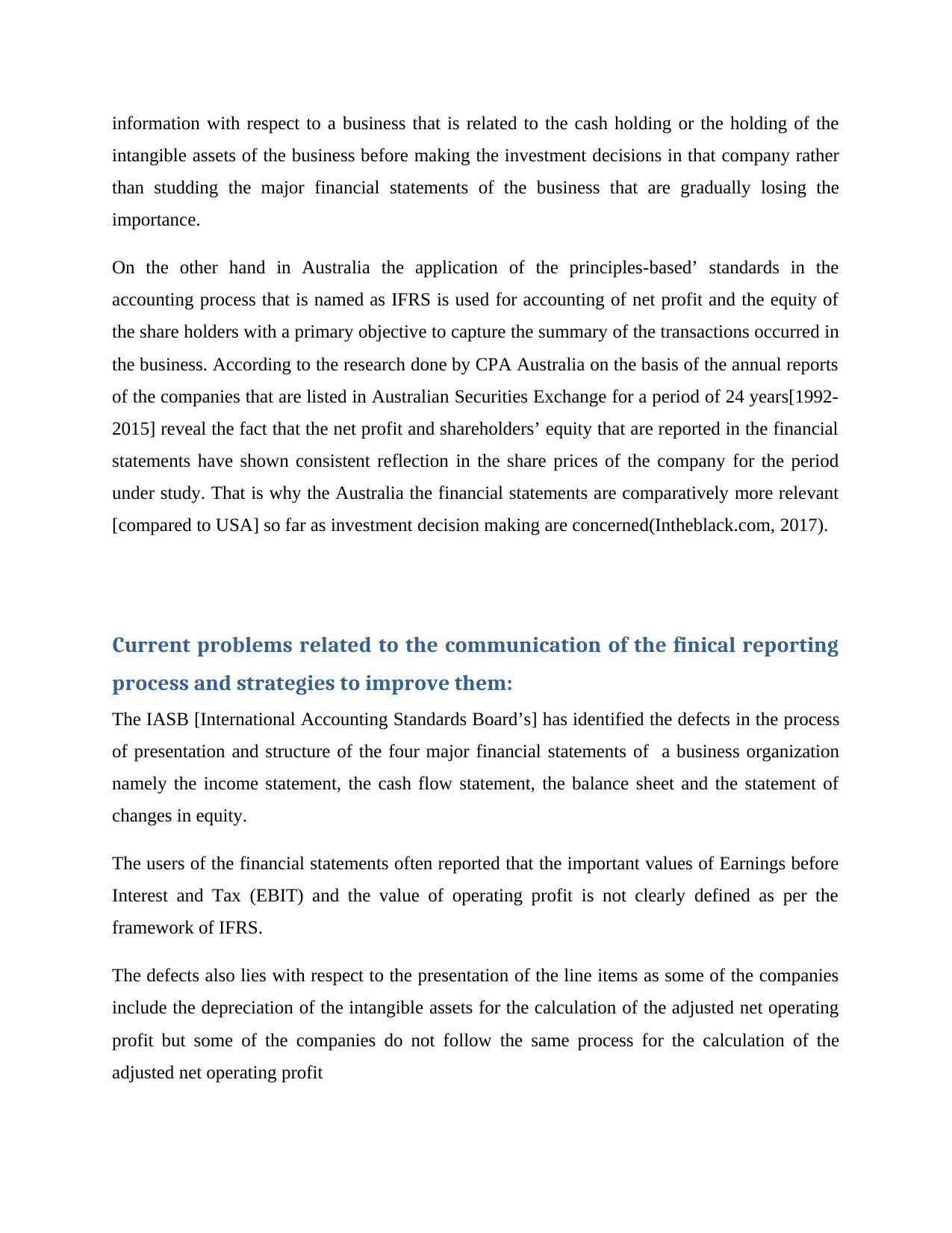
information with respect to a business that is related to the cash holding or the holding of the
intangible assets of the business before making the investment decisions in that company rather
than studding the major financial statements of the business that are gradually losing the
importance.
On the other hand in Australia the application of the principles-based’ standards in the
accounting process that is named as IFRS is used for accounting of net profit and the equity of
the share holders with a primary objective to capture the summary of the transactions occurred in
the business. According to the research done by CPA Australia on the basis of the annual reports
of the companies that are listed in Australian Securities Exchange for a period of 24 years[1992-
2015] reveal the fact that the net profit and shareholders’ equity that are reported in the financial
statements have shown consistent reflection in the share prices of the company for the period
under study. That is why the Australia the financial statements are comparatively more relevant
[compared to USA] so far as investment decision making are concerned(Intheblack.com, 2017).
Current problems related to the communication of the finical reporting
process and strategies to improve them:
The IASB [International Accounting Standards Board’s] has identified the defects in the process
of presentation and structure of the four major financial statements of a business organization
namely the income statement, the cash flow statement, the balance sheet and the statement of
changes in equity.
The users of the financial statements often reported that the important values of Earnings before
Interest and Tax (EBIT) and the value of operating profit is not clearly defined as per the
framework of IFRS.
The defects also lies with respect to the presentation of the line items as some of the companies
include the depreciation of the intangible assets for the calculation of the adjusted net operating
profit but some of the companies do not follow the same process for the calculation of the
adjusted net operating profit
intangible assets of the business before making the investment decisions in that company rather
than studding the major financial statements of the business that are gradually losing the
importance.
On the other hand in Australia the application of the principles-based’ standards in the
accounting process that is named as IFRS is used for accounting of net profit and the equity of
the share holders with a primary objective to capture the summary of the transactions occurred in
the business. According to the research done by CPA Australia on the basis of the annual reports
of the companies that are listed in Australian Securities Exchange for a period of 24 years[1992-
2015] reveal the fact that the net profit and shareholders’ equity that are reported in the financial
statements have shown consistent reflection in the share prices of the company for the period
under study. That is why the Australia the financial statements are comparatively more relevant
[compared to USA] so far as investment decision making are concerned(Intheblack.com, 2017).
Current problems related to the communication of the finical reporting
process and strategies to improve them:
The IASB [International Accounting Standards Board’s] has identified the defects in the process
of presentation and structure of the four major financial statements of a business organization
namely the income statement, the cash flow statement, the balance sheet and the statement of
changes in equity.
The users of the financial statements often reported that the important values of Earnings before
Interest and Tax (EBIT) and the value of operating profit is not clearly defined as per the
framework of IFRS.
The defects also lies with respect to the presentation of the line items as some of the companies
include the depreciation of the intangible assets for the calculation of the adjusted net operating
profit but some of the companies do not follow the same process for the calculation of the
adjusted net operating profit
⊘ This is a preview!⊘
Do you want full access?
Subscribe today to unlock all pages.

Trusted by 1+ million students worldwide
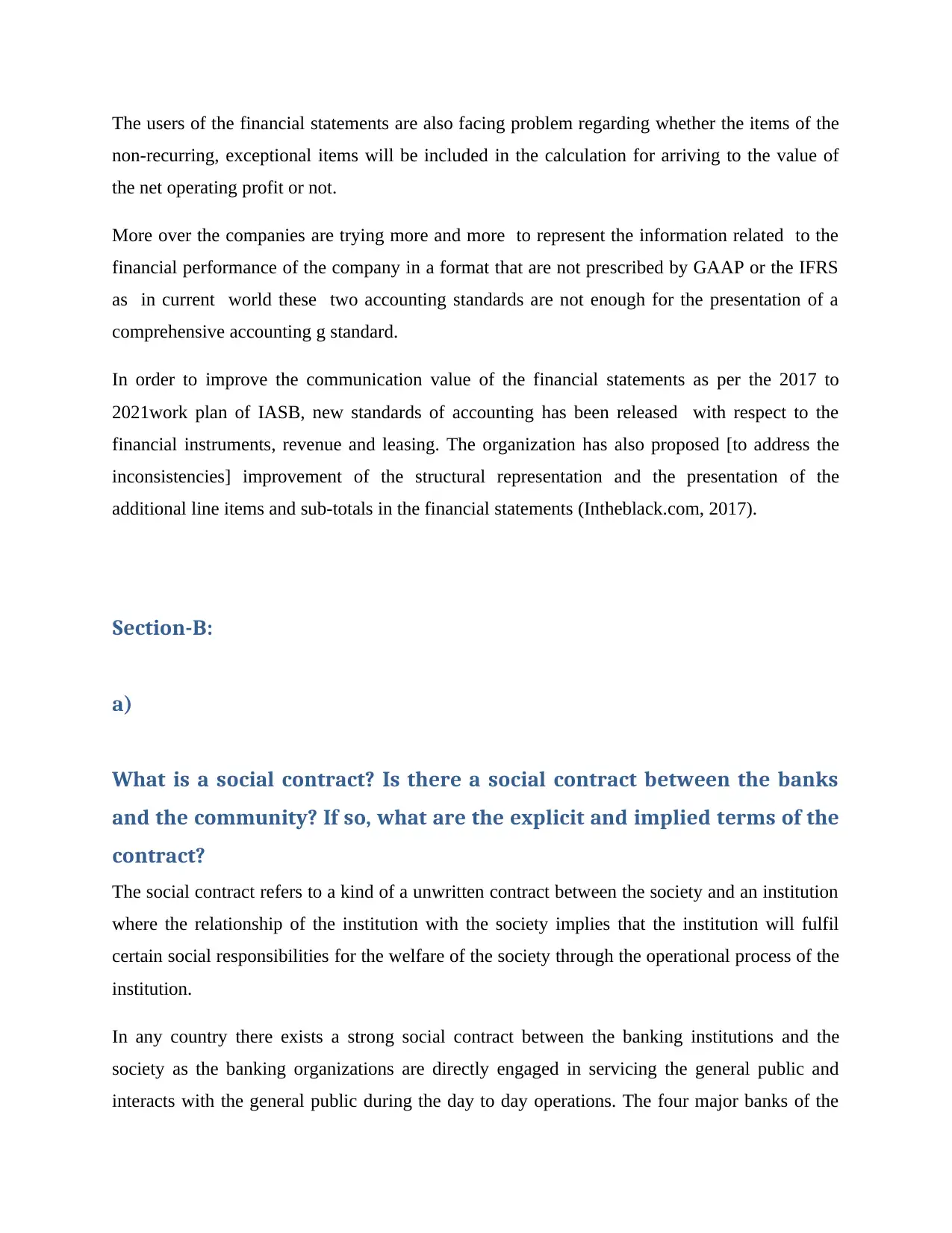
The users of the financial statements are also facing problem regarding whether the items of the
non-recurring, exceptional items will be included in the calculation for arriving to the value of
the net operating profit or not.
More over the companies are trying more and more to represent the information related to the
financial performance of the company in a format that are not prescribed by GAAP or the IFRS
as in current world these two accounting standards are not enough for the presentation of a
comprehensive accounting g standard.
In order to improve the communication value of the financial statements as per the 2017 to
2021work plan of IASB, new standards of accounting has been released with respect to the
financial instruments, revenue and leasing. The organization has also proposed [to address the
inconsistencies] improvement of the structural representation and the presentation of the
additional line items and sub-totals in the financial statements (Intheblack.com, 2017).
Section-B:
a)
What is a social contract? Is there a social contract between the banks
and the community? If so, what are the explicit and implied terms of the
contract?
The social contract refers to a kind of a unwritten contract between the society and an institution
where the relationship of the institution with the society implies that the institution will fulfil
certain social responsibilities for the welfare of the society through the operational process of the
institution.
In any country there exists a strong social contract between the banking institutions and the
society as the banking organizations are directly engaged in servicing the general public and
interacts with the general public during the day to day operations. The four major banks of the
non-recurring, exceptional items will be included in the calculation for arriving to the value of
the net operating profit or not.
More over the companies are trying more and more to represent the information related to the
financial performance of the company in a format that are not prescribed by GAAP or the IFRS
as in current world these two accounting standards are not enough for the presentation of a
comprehensive accounting g standard.
In order to improve the communication value of the financial statements as per the 2017 to
2021work plan of IASB, new standards of accounting has been released with respect to the
financial instruments, revenue and leasing. The organization has also proposed [to address the
inconsistencies] improvement of the structural representation and the presentation of the
additional line items and sub-totals in the financial statements (Intheblack.com, 2017).
Section-B:
a)
What is a social contract? Is there a social contract between the banks
and the community? If so, what are the explicit and implied terms of the
contract?
The social contract refers to a kind of a unwritten contract between the society and an institution
where the relationship of the institution with the society implies that the institution will fulfil
certain social responsibilities for the welfare of the society through the operational process of the
institution.
In any country there exists a strong social contract between the banking institutions and the
society as the banking organizations are directly engaged in servicing the general public and
interacts with the general public during the day to day operations. The four major banks of the
Paraphrase This Document
Need a fresh take? Get an instant paraphrase of this document with our AI Paraphraser
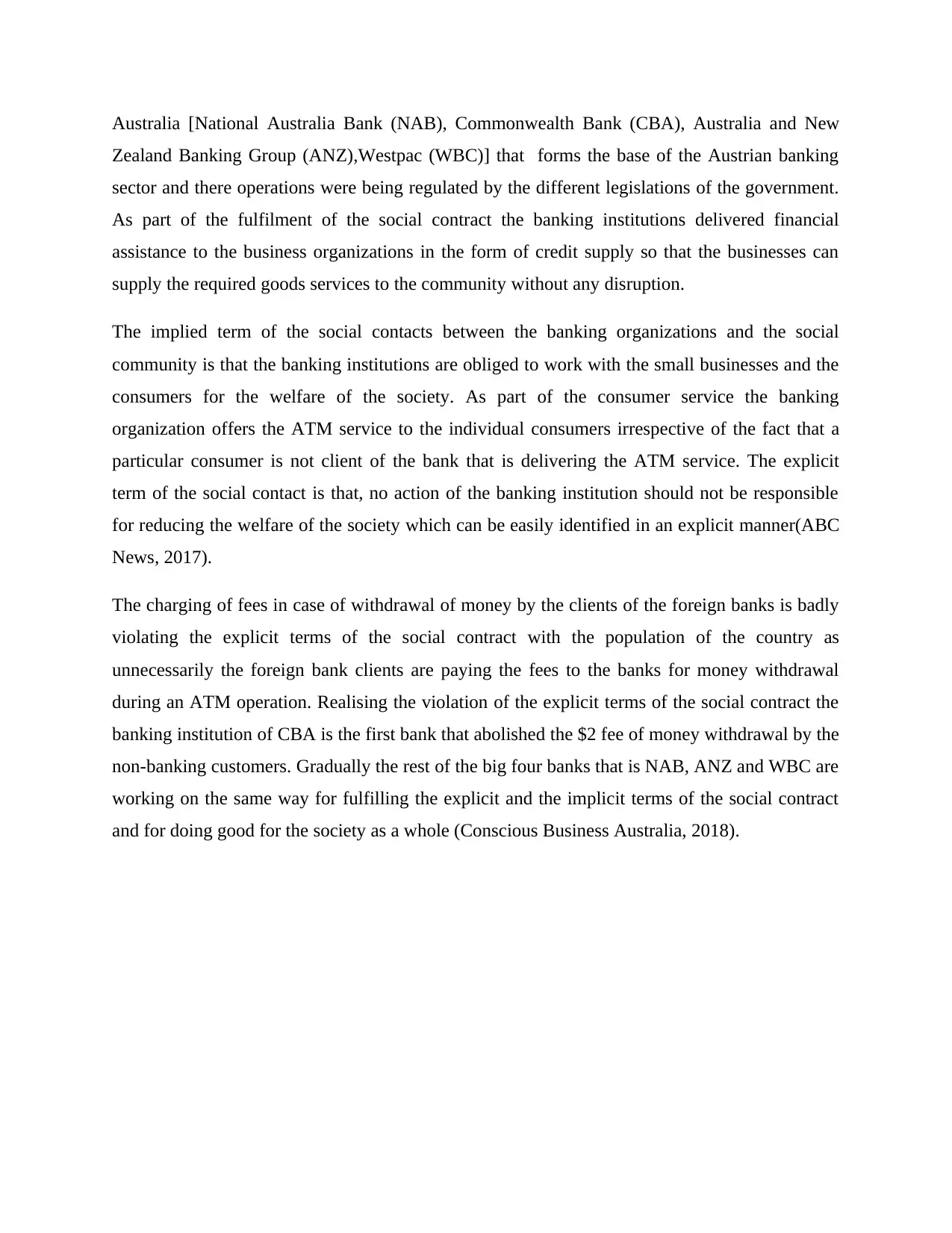
Australia [National Australia Bank (NAB), Commonwealth Bank (CBA), Australia and New
Zealand Banking Group (ANZ),Westpac (WBC)] that forms the base of the Austrian banking
sector and there operations were being regulated by the different legislations of the government.
As part of the fulfilment of the social contract the banking institutions delivered financial
assistance to the business organizations in the form of credit supply so that the businesses can
supply the required goods services to the community without any disruption.
The implied term of the social contacts between the banking organizations and the social
community is that the banking institutions are obliged to work with the small businesses and the
consumers for the welfare of the society. As part of the consumer service the banking
organization offers the ATM service to the individual consumers irrespective of the fact that a
particular consumer is not client of the bank that is delivering the ATM service. The explicit
term of the social contact is that, no action of the banking institution should not be responsible
for reducing the welfare of the society which can be easily identified in an explicit manner(ABC
News, 2017).
The charging of fees in case of withdrawal of money by the clients of the foreign banks is badly
violating the explicit terms of the social contract with the population of the country as
unnecessarily the foreign bank clients are paying the fees to the banks for money withdrawal
during an ATM operation. Realising the violation of the explicit terms of the social contract the
banking institution of CBA is the first bank that abolished the $2 fee of money withdrawal by the
non-banking customers. Gradually the rest of the big four banks that is NAB, ANZ and WBC are
working on the same way for fulfilling the explicit and the implicit terms of the social contract
and for doing good for the society as a whole (Conscious Business Australia, 2018).
Zealand Banking Group (ANZ),Westpac (WBC)] that forms the base of the Austrian banking
sector and there operations were being regulated by the different legislations of the government.
As part of the fulfilment of the social contract the banking institutions delivered financial
assistance to the business organizations in the form of credit supply so that the businesses can
supply the required goods services to the community without any disruption.
The implied term of the social contacts between the banking organizations and the social
community is that the banking institutions are obliged to work with the small businesses and the
consumers for the welfare of the society. As part of the consumer service the banking
organization offers the ATM service to the individual consumers irrespective of the fact that a
particular consumer is not client of the bank that is delivering the ATM service. The explicit
term of the social contact is that, no action of the banking institution should not be responsible
for reducing the welfare of the society which can be easily identified in an explicit manner(ABC
News, 2017).
The charging of fees in case of withdrawal of money by the clients of the foreign banks is badly
violating the explicit terms of the social contract with the population of the country as
unnecessarily the foreign bank clients are paying the fees to the banks for money withdrawal
during an ATM operation. Realising the violation of the explicit terms of the social contract the
banking institution of CBA is the first bank that abolished the $2 fee of money withdrawal by the
non-banking customers. Gradually the rest of the big four banks that is NAB, ANZ and WBC are
working on the same way for fulfilling the explicit and the implicit terms of the social contract
and for doing good for the society as a whole (Conscious Business Australia, 2018).
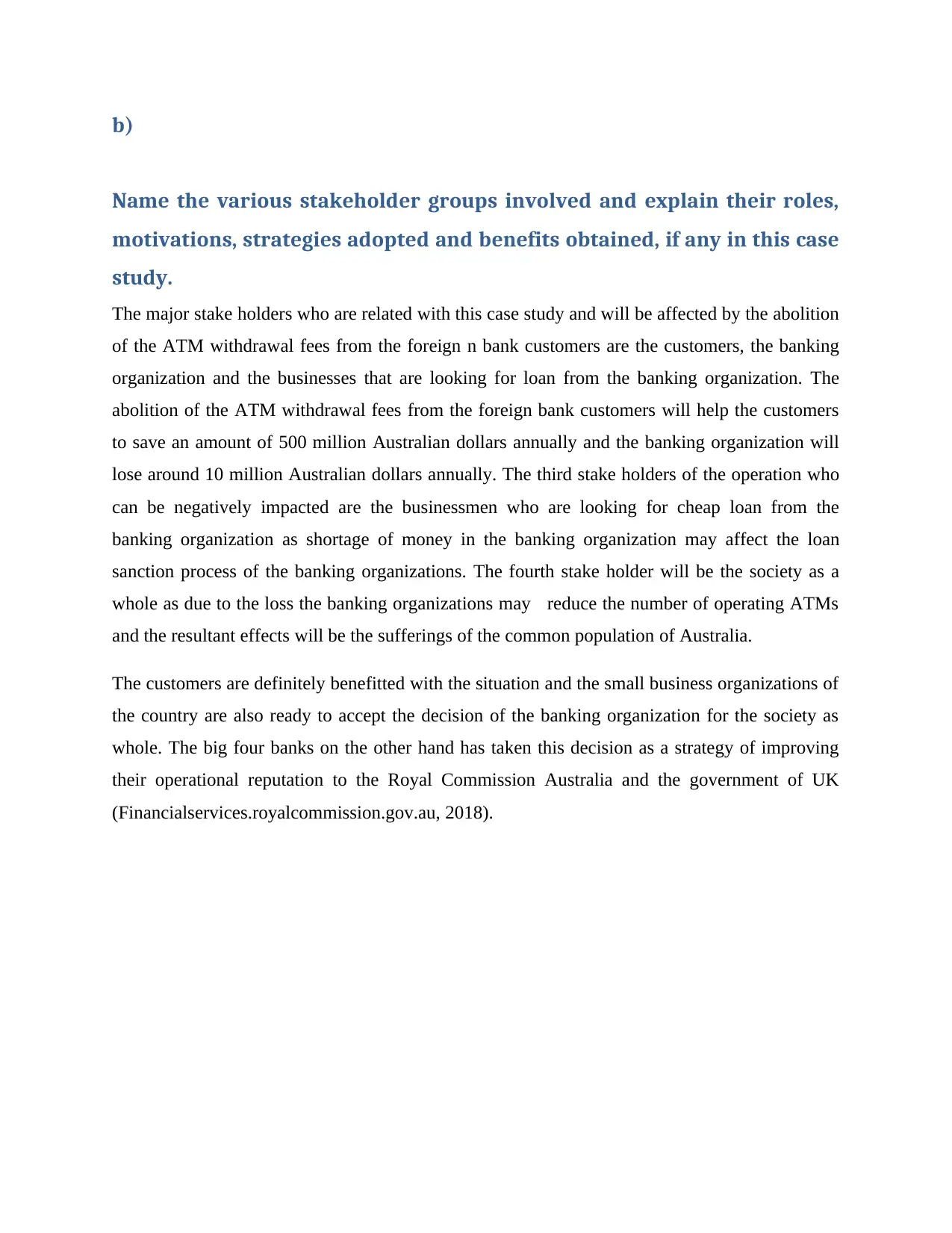
b)
Name the various stakeholder groups involved and explain their roles,
motivations, strategies adopted and benefits obtained, if any in this case
study.
The major stake holders who are related with this case study and will be affected by the abolition
of the ATM withdrawal fees from the foreign n bank customers are the customers, the banking
organization and the businesses that are looking for loan from the banking organization. The
abolition of the ATM withdrawal fees from the foreign bank customers will help the customers
to save an amount of 500 million Australian dollars annually and the banking organization will
lose around 10 million Australian dollars annually. The third stake holders of the operation who
can be negatively impacted are the businessmen who are looking for cheap loan from the
banking organization as shortage of money in the banking organization may affect the loan
sanction process of the banking organizations. The fourth stake holder will be the society as a
whole as due to the loss the banking organizations may reduce the number of operating ATMs
and the resultant effects will be the sufferings of the common population of Australia.
The customers are definitely benefitted with the situation and the small business organizations of
the country are also ready to accept the decision of the banking organization for the society as
whole. The big four banks on the other hand has taken this decision as a strategy of improving
their operational reputation to the Royal Commission Australia and the government of UK
(Financialservices.royalcommission.gov.au, 2018).
Name the various stakeholder groups involved and explain their roles,
motivations, strategies adopted and benefits obtained, if any in this case
study.
The major stake holders who are related with this case study and will be affected by the abolition
of the ATM withdrawal fees from the foreign n bank customers are the customers, the banking
organization and the businesses that are looking for loan from the banking organization. The
abolition of the ATM withdrawal fees from the foreign bank customers will help the customers
to save an amount of 500 million Australian dollars annually and the banking organization will
lose around 10 million Australian dollars annually. The third stake holders of the operation who
can be negatively impacted are the businessmen who are looking for cheap loan from the
banking organization as shortage of money in the banking organization may affect the loan
sanction process of the banking organizations. The fourth stake holder will be the society as a
whole as due to the loss the banking organizations may reduce the number of operating ATMs
and the resultant effects will be the sufferings of the common population of Australia.
The customers are definitely benefitted with the situation and the small business organizations of
the country are also ready to accept the decision of the banking organization for the society as
whole. The big four banks on the other hand has taken this decision as a strategy of improving
their operational reputation to the Royal Commission Australia and the government of UK
(Financialservices.royalcommission.gov.au, 2018).
⊘ This is a preview!⊘
Do you want full access?
Subscribe today to unlock all pages.

Trusted by 1+ million students worldwide
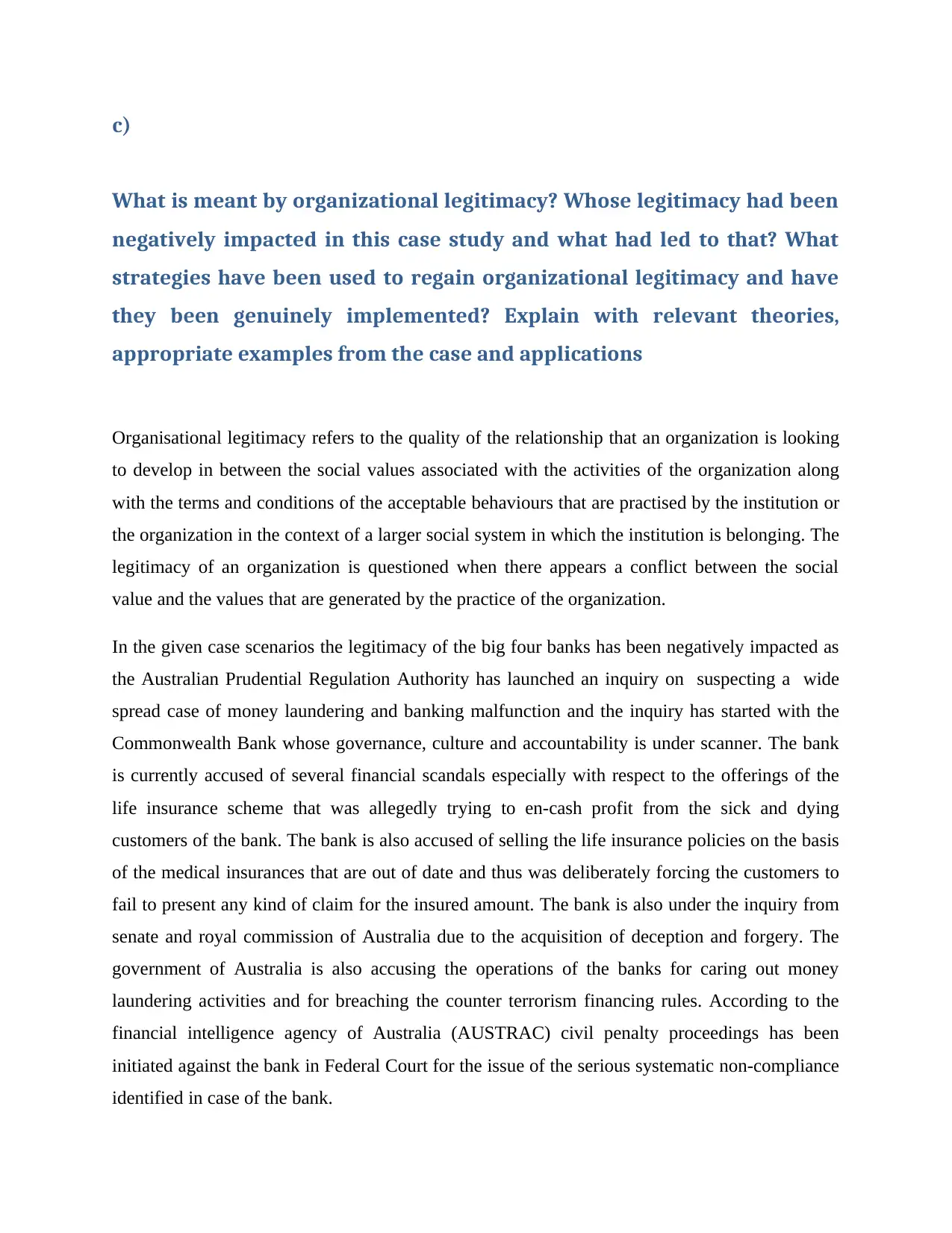
c)
What is meant by organizational legitimacy? Whose legitimacy had been
negatively impacted in this case study and what had led to that? What
strategies have been used to regain organizational legitimacy and have
they been genuinely implemented? Explain with relevant theories,
appropriate examples from the case and applications
Organisational legitimacy refers to the quality of the relationship that an organization is looking
to develop in between the social values associated with the activities of the organization along
with the terms and conditions of the acceptable behaviours that are practised by the institution or
the organization in the context of a larger social system in which the institution is belonging. The
legitimacy of an organization is questioned when there appears a conflict between the social
value and the values that are generated by the practice of the organization.
In the given case scenarios the legitimacy of the big four banks has been negatively impacted as
the Australian Prudential Regulation Authority has launched an inquiry on suspecting a wide
spread case of money laundering and banking malfunction and the inquiry has started with the
Commonwealth Bank whose governance, culture and accountability is under scanner. The bank
is currently accused of several financial scandals especially with respect to the offerings of the
life insurance scheme that was allegedly trying to en-cash profit from the sick and dying
customers of the bank. The bank is also accused of selling the life insurance policies on the basis
of the medical insurances that are out of date and thus was deliberately forcing the customers to
fail to present any kind of claim for the insured amount. The bank is also under the inquiry from
senate and royal commission of Australia due to the acquisition of deception and forgery. The
government of Australia is also accusing the operations of the banks for caring out money
laundering activities and for breaching the counter terrorism financing rules. According to the
financial intelligence agency of Australia (AUSTRAC) civil penalty proceedings has been
initiated against the bank in Federal Court for the issue of the serious systematic non-compliance
identified in case of the bank.
What is meant by organizational legitimacy? Whose legitimacy had been
negatively impacted in this case study and what had led to that? What
strategies have been used to regain organizational legitimacy and have
they been genuinely implemented? Explain with relevant theories,
appropriate examples from the case and applications
Organisational legitimacy refers to the quality of the relationship that an organization is looking
to develop in between the social values associated with the activities of the organization along
with the terms and conditions of the acceptable behaviours that are practised by the institution or
the organization in the context of a larger social system in which the institution is belonging. The
legitimacy of an organization is questioned when there appears a conflict between the social
value and the values that are generated by the practice of the organization.
In the given case scenarios the legitimacy of the big four banks has been negatively impacted as
the Australian Prudential Regulation Authority has launched an inquiry on suspecting a wide
spread case of money laundering and banking malfunction and the inquiry has started with the
Commonwealth Bank whose governance, culture and accountability is under scanner. The bank
is currently accused of several financial scandals especially with respect to the offerings of the
life insurance scheme that was allegedly trying to en-cash profit from the sick and dying
customers of the bank. The bank is also accused of selling the life insurance policies on the basis
of the medical insurances that are out of date and thus was deliberately forcing the customers to
fail to present any kind of claim for the insured amount. The bank is also under the inquiry from
senate and royal commission of Australia due to the acquisition of deception and forgery. The
government of Australia is also accusing the operations of the banks for caring out money
laundering activities and for breaching the counter terrorism financing rules. According to the
financial intelligence agency of Australia (AUSTRAC) civil penalty proceedings has been
initiated against the bank in Federal Court for the issue of the serious systematic non-compliance
identified in case of the bank.
Paraphrase This Document
Need a fresh take? Get an instant paraphrase of this document with our AI Paraphraser
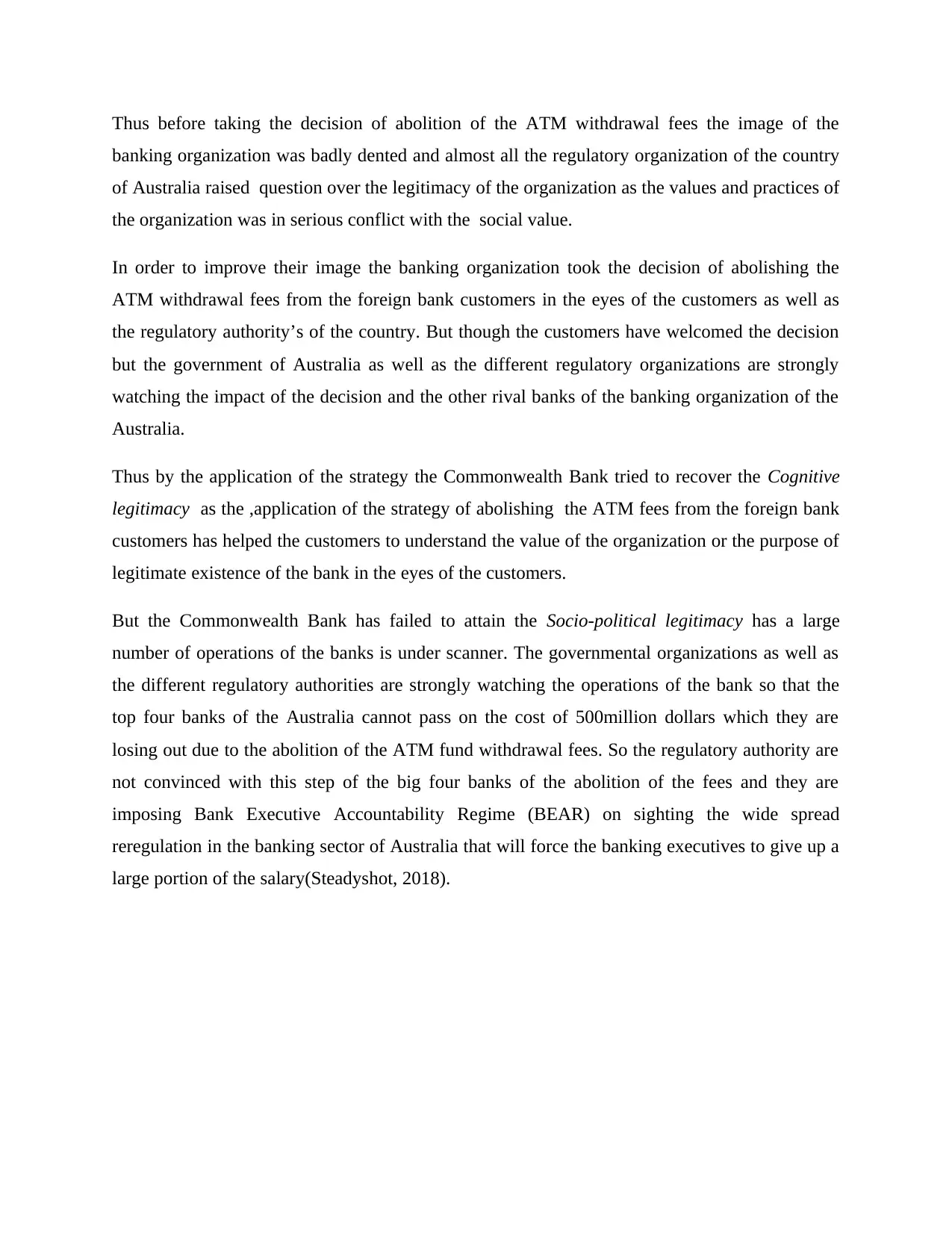
Thus before taking the decision of abolition of the ATM withdrawal fees the image of the
banking organization was badly dented and almost all the regulatory organization of the country
of Australia raised question over the legitimacy of the organization as the values and practices of
the organization was in serious conflict with the social value.
In order to improve their image the banking organization took the decision of abolishing the
ATM withdrawal fees from the foreign bank customers in the eyes of the customers as well as
the regulatory authority’s of the country. But though the customers have welcomed the decision
but the government of Australia as well as the different regulatory organizations are strongly
watching the impact of the decision and the other rival banks of the banking organization of the
Australia.
Thus by the application of the strategy the Commonwealth Bank tried to recover the Cognitive
legitimacy as the ,application of the strategy of abolishing the ATM fees from the foreign bank
customers has helped the customers to understand the value of the organization or the purpose of
legitimate existence of the bank in the eyes of the customers.
But the Commonwealth Bank has failed to attain the Socio-political legitimacy has a large
number of operations of the banks is under scanner. The governmental organizations as well as
the different regulatory authorities are strongly watching the operations of the bank so that the
top four banks of the Australia cannot pass on the cost of 500million dollars which they are
losing out due to the abolition of the ATM fund withdrawal fees. So the regulatory authority are
not convinced with this step of the big four banks of the abolition of the fees and they are
imposing Bank Executive Accountability Regime (BEAR) on sighting the wide spread
reregulation in the banking sector of Australia that will force the banking executives to give up a
large portion of the salary(Steadyshot, 2018).
banking organization was badly dented and almost all the regulatory organization of the country
of Australia raised question over the legitimacy of the organization as the values and practices of
the organization was in serious conflict with the social value.
In order to improve their image the banking organization took the decision of abolishing the
ATM withdrawal fees from the foreign bank customers in the eyes of the customers as well as
the regulatory authority’s of the country. But though the customers have welcomed the decision
but the government of Australia as well as the different regulatory organizations are strongly
watching the impact of the decision and the other rival banks of the banking organization of the
Australia.
Thus by the application of the strategy the Commonwealth Bank tried to recover the Cognitive
legitimacy as the ,application of the strategy of abolishing the ATM fees from the foreign bank
customers has helped the customers to understand the value of the organization or the purpose of
legitimate existence of the bank in the eyes of the customers.
But the Commonwealth Bank has failed to attain the Socio-political legitimacy has a large
number of operations of the banks is under scanner. The governmental organizations as well as
the different regulatory authorities are strongly watching the operations of the bank so that the
top four banks of the Australia cannot pass on the cost of 500million dollars which they are
losing out due to the abolition of the ATM fund withdrawal fees. So the regulatory authority are
not convinced with this step of the big four banks of the abolition of the fees and they are
imposing Bank Executive Accountability Regime (BEAR) on sighting the wide spread
reregulation in the banking sector of Australia that will force the banking executives to give up a
large portion of the salary(Steadyshot, 2018).
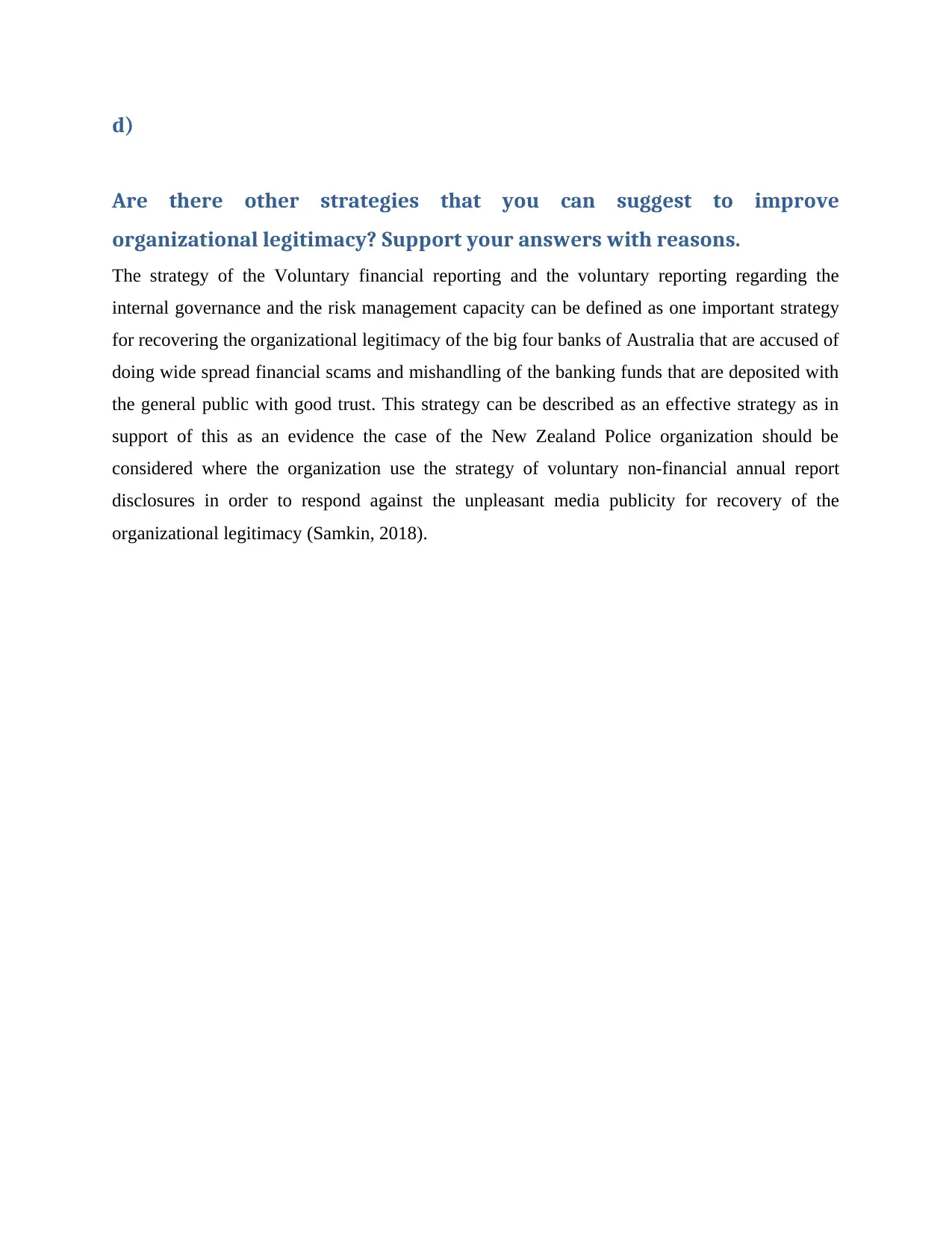
d)
Are there other strategies that you can suggest to improve
organizational legitimacy? Support your answers with reasons.
The strategy of the Voluntary financial reporting and the voluntary reporting regarding the
internal governance and the risk management capacity can be defined as one important strategy
for recovering the organizational legitimacy of the big four banks of Australia that are accused of
doing wide spread financial scams and mishandling of the banking funds that are deposited with
the general public with good trust. This strategy can be described as an effective strategy as in
support of this as an evidence the case of the New Zealand Police organization should be
considered where the organization use the strategy of voluntary non-financial annual report
disclosures in order to respond against the unpleasant media publicity for recovery of the
organizational legitimacy (Samkin, 2018).
Are there other strategies that you can suggest to improve
organizational legitimacy? Support your answers with reasons.
The strategy of the Voluntary financial reporting and the voluntary reporting regarding the
internal governance and the risk management capacity can be defined as one important strategy
for recovering the organizational legitimacy of the big four banks of Australia that are accused of
doing wide spread financial scams and mishandling of the banking funds that are deposited with
the general public with good trust. This strategy can be described as an effective strategy as in
support of this as an evidence the case of the New Zealand Police organization should be
considered where the organization use the strategy of voluntary non-financial annual report
disclosures in order to respond against the unpleasant media publicity for recovery of the
organizational legitimacy (Samkin, 2018).
⊘ This is a preview!⊘
Do you want full access?
Subscribe today to unlock all pages.

Trusted by 1+ million students worldwide
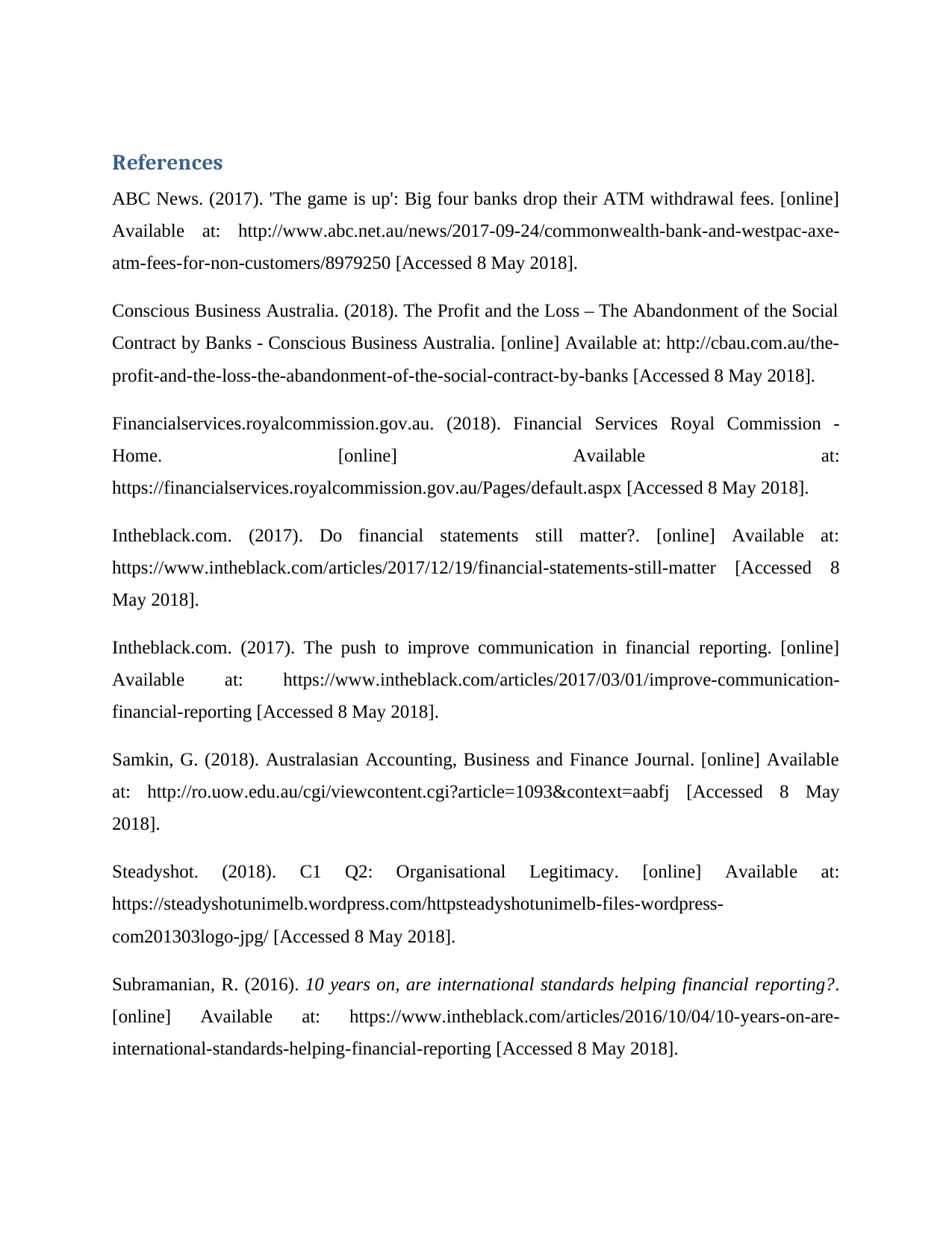
References
ABC News. (2017). 'The game is up': Big four banks drop their ATM withdrawal fees. [online]
Available at: http://www.abc.net.au/news/2017-09-24/commonwealth-bank-and-westpac-axe-
atm-fees-for-non-customers/8979250 [Accessed 8 May 2018].
Conscious Business Australia. (2018). The Profit and the Loss – The Abandonment of the Social
Contract by Banks - Conscious Business Australia. [online] Available at: http://cbau.com.au/the-
profit-and-the-loss-the-abandonment-of-the-social-contract-by-banks [Accessed 8 May 2018].
Financialservices.royalcommission.gov.au. (2018). Financial Services Royal Commission -
Home. [online] Available at:
https://financialservices.royalcommission.gov.au/Pages/default.aspx [Accessed 8 May 2018].
Intheblack.com. (2017). Do financial statements still matter?. [online] Available at:
https://www.intheblack.com/articles/2017/12/19/financial-statements-still-matter [Accessed 8
May 2018].
Intheblack.com. (2017). The push to improve communication in financial reporting. [online]
Available at: https://www.intheblack.com/articles/2017/03/01/improve-communication-
financial-reporting [Accessed 8 May 2018].
Samkin, G. (2018). Australasian Accounting, Business and Finance Journal. [online] Available
at: http://ro.uow.edu.au/cgi/viewcontent.cgi?article=1093&context=aabfj [Accessed 8 May
2018].
Steadyshot. (2018). C1 Q2: Organisational Legitimacy. [online] Available at:
https://steadyshotunimelb.wordpress.com/httpsteadyshotunimelb-files-wordpress-
com201303logo-jpg/ [Accessed 8 May 2018].
Subramanian, R. (2016). 10 years on, are international standards helping financial reporting?.
[online] Available at: https://www.intheblack.com/articles/2016/10/04/10-years-on-are-
international-standards-helping-financial-reporting [Accessed 8 May 2018].
ABC News. (2017). 'The game is up': Big four banks drop their ATM withdrawal fees. [online]
Available at: http://www.abc.net.au/news/2017-09-24/commonwealth-bank-and-westpac-axe-
atm-fees-for-non-customers/8979250 [Accessed 8 May 2018].
Conscious Business Australia. (2018). The Profit and the Loss – The Abandonment of the Social
Contract by Banks - Conscious Business Australia. [online] Available at: http://cbau.com.au/the-
profit-and-the-loss-the-abandonment-of-the-social-contract-by-banks [Accessed 8 May 2018].
Financialservices.royalcommission.gov.au. (2018). Financial Services Royal Commission -
Home. [online] Available at:
https://financialservices.royalcommission.gov.au/Pages/default.aspx [Accessed 8 May 2018].
Intheblack.com. (2017). Do financial statements still matter?. [online] Available at:
https://www.intheblack.com/articles/2017/12/19/financial-statements-still-matter [Accessed 8
May 2018].
Intheblack.com. (2017). The push to improve communication in financial reporting. [online]
Available at: https://www.intheblack.com/articles/2017/03/01/improve-communication-
financial-reporting [Accessed 8 May 2018].
Samkin, G. (2018). Australasian Accounting, Business and Finance Journal. [online] Available
at: http://ro.uow.edu.au/cgi/viewcontent.cgi?article=1093&context=aabfj [Accessed 8 May
2018].
Steadyshot. (2018). C1 Q2: Organisational Legitimacy. [online] Available at:
https://steadyshotunimelb.wordpress.com/httpsteadyshotunimelb-files-wordpress-
com201303logo-jpg/ [Accessed 8 May 2018].
Subramanian, R. (2016). 10 years on, are international standards helping financial reporting?.
[online] Available at: https://www.intheblack.com/articles/2016/10/04/10-years-on-are-
international-standards-helping-financial-reporting [Accessed 8 May 2018].
1 out of 10
Related Documents
Your All-in-One AI-Powered Toolkit for Academic Success.
+13062052269
info@desklib.com
Available 24*7 on WhatsApp / Email
![[object Object]](/_next/static/media/star-bottom.7253800d.svg)
Unlock your academic potential
Copyright © 2020–2026 A2Z Services. All Rights Reserved. Developed and managed by ZUCOL.





